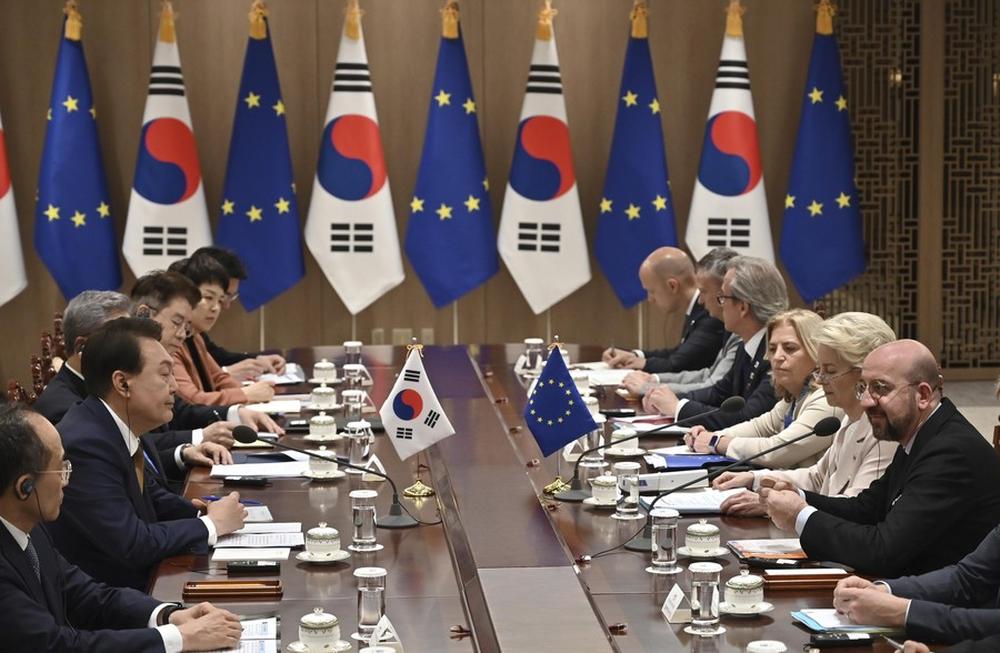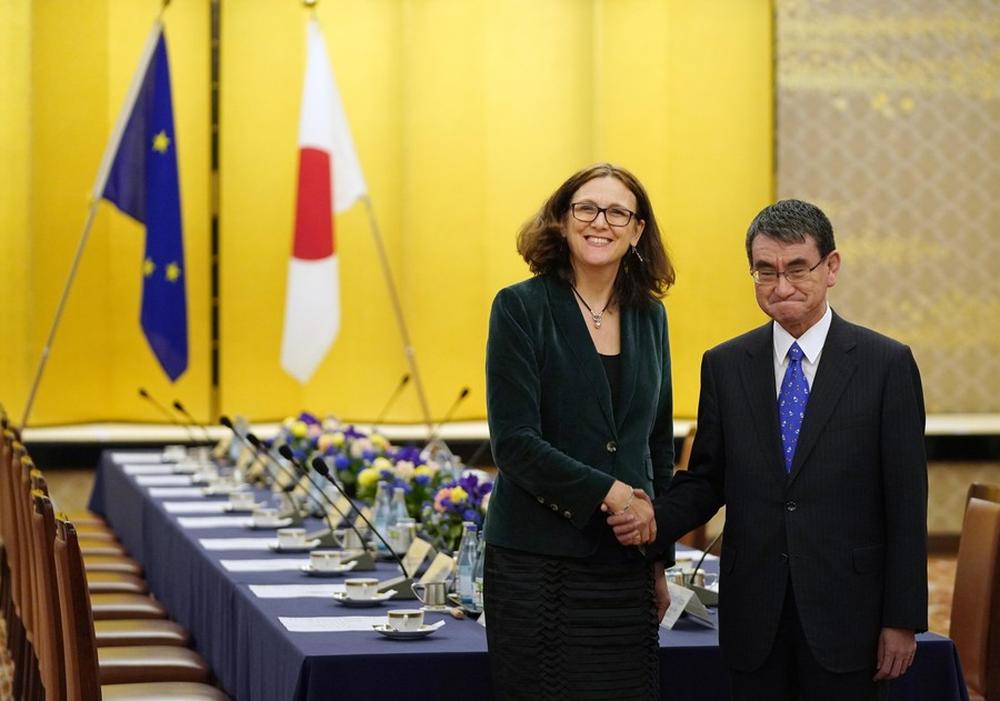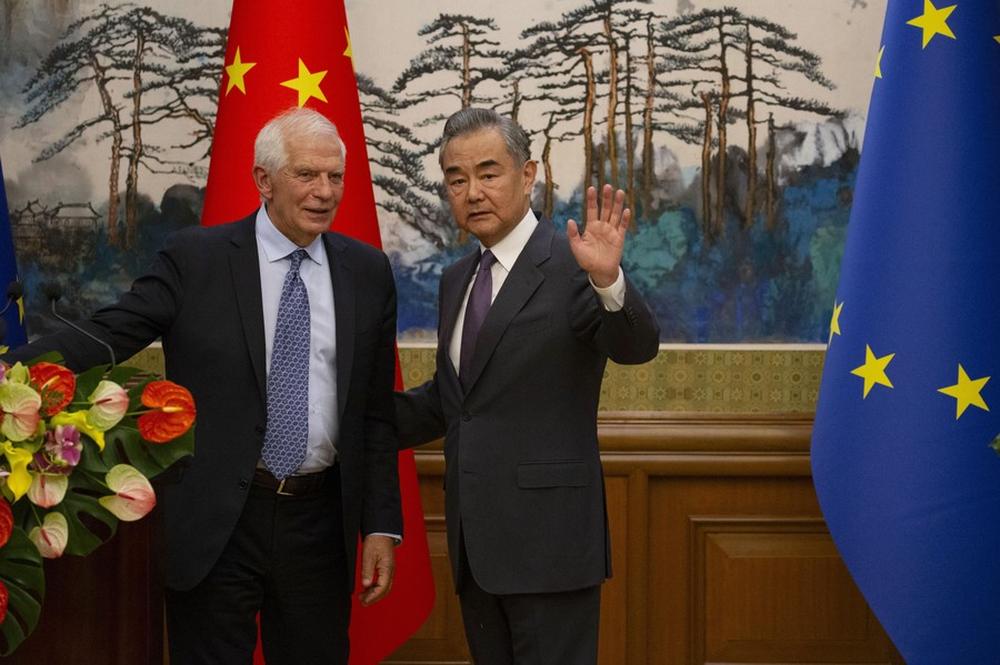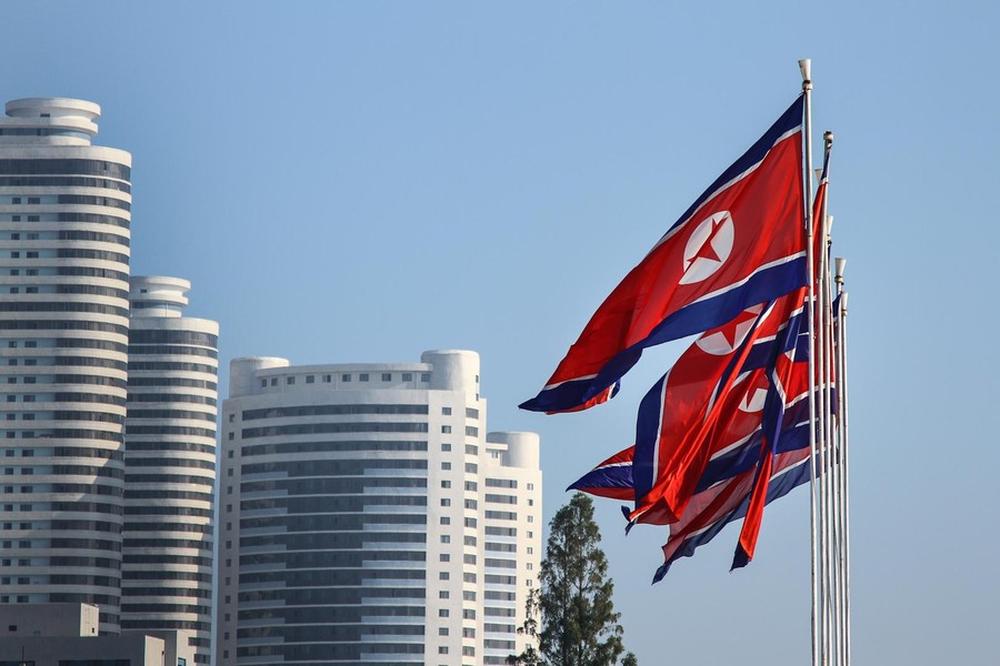- #Economy & Trade
- #Europe
- #Global Issues

► The June 2023 joint statement issued by the EU and South Korea following from their bilateral summit symbolised where their relationship stands today: a comprehensive partnership covering all aspects of economics, politics, and security. From the perspective of the EU and its member states, South Korea and Japan are the top partners in Asia and the Indo-Pacific.
► And the relationship is only going to strengthen as the EU and South Korea face common challenges such as navigating US-China competition, responding to China’s aggressiveness and Russia’s invasion of Ukraine, trying to salvage some aspects of the multilateralism that has served both of them so well or boosting ties with increasingly more important countries from the so-called ‘Global South’.
► Anchored by the new bilateral strategic dialogue launched earlier this year, the geopolitical EU is prioritising cooperation with South Korea as a partner not only in the Indo-Pacific region but also in Europe itself and globally
The June 2023 joint statement issued by the EU and South Korea following from their bilateral summit symbolised where their relationship stands today: a comprehensive partnership covering all aspects of economics, politics, and security. From the perspective of the EU and its member states, South Korea and Japan are the top partners in Asia and the Indo-Pacific. And the relationship is only going to strengthen as the EU and South Korea face common challenges such as navigating US-China competition, responding to China’s aggressiveness and Russia’s invasion of Ukraine, trying to salvage some aspects of the multilateralism that has served both of them so well or boosting ties with increasingly more important countries from the so-called ‘Global South’.
In this context, one element to emphasise is that from the perspective of the EU the relationship has moved from saying to doing. In other words, dialogue, meetings, and exchanges continue to matter. But the EU and South Korea have to deliver on their partnership, whether cooperating at the bilateral level, working together with ‘like-minded’ partners in minilateral settings or promoting collaboration at the global level via multilateral institutions. Indeed, the EU is increasingly accepting of the need for minilateralism to be part of its menu of options to advance its interests, a move partly driven by member states which, with few exceptions, are also members of a revitalised NATO and thus understand the value of smaller institutions.
Economics and trade continue to be the area in which EU-South Korea relations are closest, which reflects the EU’s origins and history as an institution to facilitate free commerce. In this area, the EU would have liked to update the EU-South Korea free trade agreement, which, among others and most importantly, contains almost no provisions on digital trade. Since this has proved difficult for political reasons, the EU now counts on the bilateral digital partnership currently under negotiation to set rules and a common understanding in this area. At the same time, the EU sees this digital partnership, along with digital trade negotiations with the United States or a digital partnership agreement already signed with Japan as a means to set the rules of the digital economy at the global level.
Treading a fine line between economic and security cooperation, economic security has rapidly emerged as an area for the EU and South Korea to work together. In line with the United States and other market economies, economic nationalism and protectionism especially vis-à-vis China has become an important feature of economic policy-making for the EU. The IRA EQUIVALENT is Brussels’s response to the Joe Biden administration’s Inflation Reduction Act (IRA). At the same time, the EU now has an investment screening mechanism as another tool in its arsenal to deal with China. South Korean firms are crucial in this respect. From a European perspective, supply chain resilience and diversification away from China cannot be achieved without technologically world-beating South Korean chaebol and other firms, whether semiconductors, electric batteries, 5G/6G or robotics. Plus, South Korean firms in areas such as electric vehicles or green shipping are seen as central to the shift towards sustainable green growth, a key ambition of the EU.
Firmly moving beyond commercial and economic considerations, European Commission President Ursula von der Leyen has repeatedly emphasised the EU needs to be a ‘geopolitical’ actor since taking office in 2019. To this end, von der Leyen has taken a ‘Team Europe’ approach. This means that the EU and its member states should work together to promote their shared interests. And without venturing beyond the digital realm, the EU sees cybersecurity and foreign interference and manipulation of information (FIMI) as two interrelated areas in which Brussels and Seoul need to boost cooperation. This includes joint tabletop exercises, information and intelligence sharing or regulation harmonisation. South Korea and the Netherlands, for example, have strong cooperation in this area, which fits within the Team Europe approach.
Maritime security is another area in which the EU would like to boost practical cooperation. In fact, cooperation has been going on for over a decade off the Gulf of Aden, where EUNAVFOR and the Cheonhae Unit have developed a very good working relationship. On top of that, the EU would be keen in having the ROK Navy conduct joint anti-piracy missions and exercises in the Gulf of Guinea and potentially off the South China Sea. And navies from countries such as France, Germany or the Netherlands have conducted joint exercises or port calls in South Korea, along with the navies of other countries such as the United States or Japan.
One area in which it remains to be seen whether the EU and South Korea can boost ties is the development of new weapons systems. The EU’s NAME OF PROGRAMME (PESCO) programme in theory allows for the participation of non-EU firms. In practice, it is more realistic for South Korea to work with NATO, especially following the June 2023 NAME OF PROGRAMME (TTIC) agreement, or with specific EU/NATO member states, such as Poland. This goes back to the point raised above: as the EU and NATO boost ties, sometimes it will be the former that works with South Korea in the area of security, sometimes it will be the latter, and other times it will be specific countries that belong to both. After all, 24 out of 27 EU member states are part of the transatlantic organisation.
In this context, the EU counts with South Korea’s continuous robust support to Ukraine via countries such as Poland or the United States as the greatest example of how practical cooperation can work even in the case of war. As most countries across the world have taken a neutral position in the conflict between Russia and Ukraine, perceptions of South Korea have greatly improved among EU policy-makers.
The EU has even quietly tentatively launched a working-level EU-AP4 process replicating NATO’s own as it has realised which countries it can really count on in times of crisis. And it is no secret that the EU is among the multiple countries and institutions looking with interest at the evolution of South Korea-United States-Japan trilateralism post-Camp David statement. There are EU officials who believe that a quadrilateral including these three countries plus Brussels itself would carry great influence globally. And whisper it, but some EU officials also understand that the G7 is obsolete in its current configuration due to its eschewed membership, and should expand to at least include South Korea and Australia.
Anchored by the new bilateral strategic dialogue launched earlier this year, the geopolitical EU is prioritising cooperation with South Korea as a partner not only in the Indo-Pacific region but also in Europe itself and globally. After all, South Korea is a partner with strong capabilities, matching interests, and shared values. And these three aspects underpin a relationship that this year reached new heights.
Ramon Pacheco Pardo is Professor of International Relations at King's College London and the KF-VUB Korea Chair at the Centre for Security, Diplomacy, and Strategy (CSDS) of the Brussels School of Governance (BSoG-VUB). He is also Non-Resident Fellow at Sejong Institute, Adjunct Fellow (Non-Resident) with the Korea Chair at CSIS, Committee Member at CSCAP EU, and Scientific Council Member at Elcano Royal Institute. His publications include the books Korea: A New History of South and North (Yale University Press, 2023; with Victor Cha), South Korea's Grand Strategy: Making Its Own Destiny (Columbia University Press, 2023), Shrimp to Whale: South Korea from the Forgotten War to K-Pop (Hurst and Oxford University Press, 2022), and North Korea-US Relations from Kim Jong Il to Kim Jong Un (Routledge, 2019).


